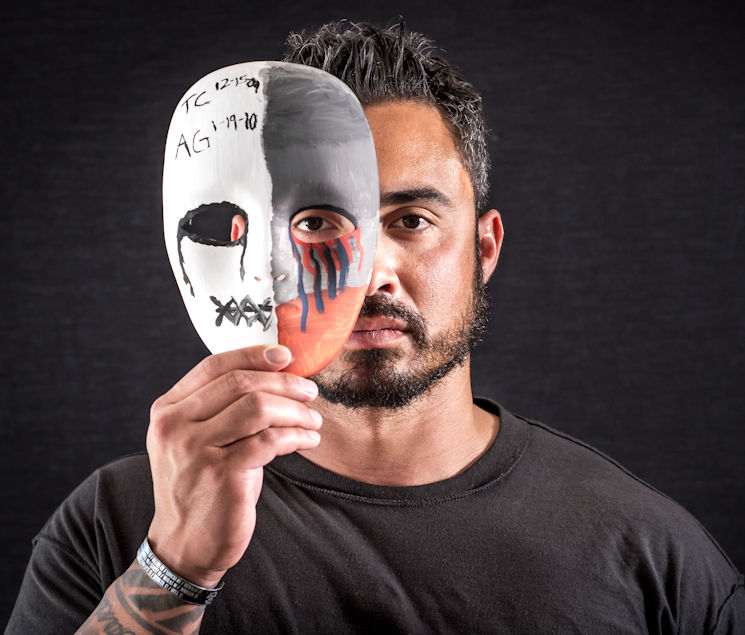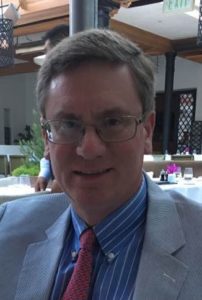|
Millions of vets are and have been successful in all endeavors.
They are doctors, lawyers, business people and a thousand other
professions.
Not all have PTSD ... not all are the troubled, brooding, street
corner homeless guy ... although they exist and need help
desperately.
|

April 5, 2017 - Retired Tech. Sgt. Chris Ferrell, a former Explosive
Ordnance Disposal technician who suffers from Post Traumatic Stress
Disorder (PTSD) and Traumatic Brain Injury after combat tours in
Afghanistan and Iraq, displays a mask he painted in Hanover, PA. The
mask, which bears the initials and dates of death of his teammates,
Tech. Sgts. Tony Campbell and Adam Ginett, is a form of art therapy
employed by therapists to help PTSD patients verbalize past
traumatic events. It is one of the therapies that will be used at
the Air Force's Invisible Wounds clinic scheduled to open at Eglin
Air Force Base, Fla., in 2018. (U.S. Air Force photo by J.M. Eddins
Jr.)
|
No matter how successful a vet might be materially, more
often than not, vets are often alone, mentally and
spiritually each day and for the rest of their lives.
Vets’ stories are all different, but some elements of
the common experience exist.
Many vets experienced
and saw and heard and did things unimaginable to the average
person. They also lived a daily camaraderie that cannot be
repeated in the civilian world. In fact, many vets spend the
rest of their lives seeking the same esprit de corps that
simply is absent from their civilian lives and jobs. They
long to spend just 15 minutes back with the best friends
they ever had, friends that are scattered to every corner of
the earth, and some to the afterlife itself.
Vets are
haunted by visions of horror and death, by guilt of somehow
surviving and living the good life, when some they knew are
gone. They strangely wish sometimes that they were back in
those dreadful circumstances, not to experience the dirt and
horror and terror and noise and violence again, but to be
with the only people a vet really knows, other vets.
Civilians must understand that for a vet nothing is ever the
same again. Their senses can be suddenly illuminated by the
slightest sound or smell or sight: sights of death all
around, a living version of Dante’s Inferno; sounds so loud
that they can only be described as Saving Private Ryan in
surround sound on steroids; smells vast and horrific;
rotting death, burning fuel and equipment, rubber, animals
and…people. The smoldering ruins of life all around them.
|

An unidentified U.S. Air Force veteran in solitary thought about
some aspect of his service that might involve PTSD or just internal
reflection on an event that he cannot properly discuss with a
non-military loved one or friend. (U.S. Air Force photo by Senior
Airman Christian Clausen - June 22, 2016)
|
All vets have these thoughts nearly every day. Some may
experience them for fractions of second, or for minutes at a
time. They replay over and over again like an endless 24
hour war movie.
Part of the solitary world of the vet
is being able to enjoy complete bliss doing absolutely
nothing. This is a trait grating to civilians who must
constantly search for endless stimuli. Unbeknownst to them,
the greatest thrill of all is just being alive. A lot of
vets have an Obi-wan Kenobi calmness. After what they went
through, how bad can anything really be?
As King said
to Chris in Platoon, “Make it outta here, it’s all gravy,
every day of the rest of your life – gravy…”
So many,
if not all vets walk around each day lost in their own
special story. They were once great actors on a giant stage
with speaking parts and props. Maybe they were heroes and
now they aren’t anymore. Maybe they helped save the world
and now they can’t. Maybe they gave orders and now they take
them. Maybe they thought that they could accomplish anything
and now they know they can’t. Perhaps their lives now are
smaller and slower and sometimes in the vet’s mind, just
incidental, even though they’re not.
Most civilians
are oblivious to the solitary life of the vet. But, it’s
there. It’s the same eternal and universal philosophy,
whether you fought in World War II, Korea, Vietnam, the Gulf
War, Iraq or Afghanistan. The experiences may have been
different, but the emotions are the same.
A problem with the solitary world of the vet is that the vet has
a hard time explaining what he or she did to those who didn’t serve.
Some vets want to talk, but they have no outlet. Maybe their only
outlet is watching a war movie or reading a book about the conflict
they were in.
How often do people say, “Grandpa never talks about Korea.”
That’s because Grandpa knows no one can understand except other
vets. That’s because Grandpa knows most people don’t care.
|

March 16, 2017 - Jeremy Yellin, a former fighter pilot in the Army
Air Corps, visited the Officers Club aboard Marine Corps Base
Hawaii. Yellin, a World War II veteran, shared his war story and how
he dealt with being diagnosed with Post Traumatic Stress Disorder to
service members and DoD employees. “I didn’t know I was sick,”
Yellin said. “The service members and veterans that commit suicide
today don’t know they’re sick.” (U.S. Marine Corps photo by Cpl.
Zachary Orr)
|
Part of this taciturn mentality is that vets speak
another language, a strange and archaic language of their
past. How do you talk to civilians about “fire for effect”
or “grid 7310” or “shake and bake” or “frag orders” or “10
days and a wake up” or a thousand and one other terms that
are mystifying to the real world?
You can’t.
All of this adds to the
solitary world of the vet. Some are better at handling life
afterwards than others. Some don’t seem affected at all, but they
are. They just hide it. Some never return to normal. But, what is
normal to a vet anymore?
So, when you see a vet sitting by
themselves at a restaurant or on a train or shopping at the grocery
store alone, take a moment to speak with them. Take them out of
their solitary world for a moment. You’ll be happy you did.
 By Ray Starmann,
Editor-In-Chief By Ray Starmann,
Editor-In-Chief
US
Defense Watch
Copyright 2015
Ray Starmann, the founder of US Defense
Watch, is a former US Army Intelligence officer and veteran of the
Gulf War, where he served with the 4th Squadron, 7th Cavalry, and
after the conflict with the 1st Squadron, 1st Cavalry, the
descendant of General Buford’s cavalry division at Gettysburg.
Mr. Starmann was a contributing writer for
several years at SFTT.org, founded by the late Colonel David
Hackworth. He has also written for Fox News, the Daily Caller,
Military.com, World at War Magazine, Strategy and Tactics Magazine,
the History Channel, Greystone TV and the Hallmark Channel. His
articles have also been published on: WND, PJ Media, Pamela Geller,
Dinesh D’Souza, Info Wars, Natural News, Allen West, Mark Levin and
Larry Elder. He is also a graduate of Southern Methodist University,
where he received a BA in History.
Veterans |
Citizens Like Us |
Comment on this article |



